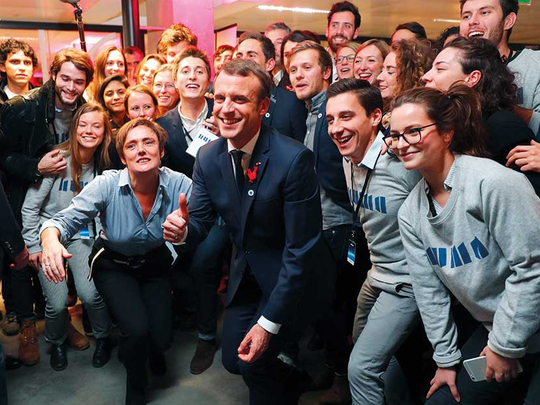
PARIS: World leaders met in Paris Tuesday seeking to unlock more money to drive the global economy’s shift to green energy, exactly two years after signing a global pact to avert worst-case-scenario global warming.
Without trillions of dollars invested in clean energy technology, the Paris Agreement’s goal to keep global warming below two degrees Celsius (3.6 degrees Fahrenheit) over pre-industrial levels will remain a pipe dream, participants warned.
“While the challenge is great, we must do everything in our power to meet it. We know it is the difference between life and death for millions of vulnerable people around the world,” said Frank Bainimarama, the prime minister of Fiji who presided over UN climate talks in Bonn last month.
“There are trillions of dollars sitting in private investment institutions … and they are all looking for opportunities to earn a return. We must unlock that finance,” he told delegates.
French President Emmanuel Macron gathered some 60 world leaders, partly in response to US President Donald Trump’s announcement in June that he would pull America out of the Paris pact which had taken nearly 200 nations more than two decades to negotiate.
About 200 protesters gathered in the Paris streets, meanwhile, demanding that France pays “not a single euro more for fossil energy”.
Mankind’s voracious burning of oil, coal and natural gas is blamed for planet-warming greenhouse gases that have caused the average global temperature to rise by about 1⁰C to date.
On current emissions trends, the world was on course for warming of 3⁰C, experts warn, with life- and asset-threatening superstorms, sea-level rise, floods and droughts the result.
Trump, who has described climate change as a “hoax”, has withdrawn billions of dollars in climate finance — including an outstanding $2 billion out of $3 billion the US, under his predecessor Barack Obama, had pledged towards the Green Climate Fund.
Stronger mobilisation
Macron Tuesday called for “much stronger mobilisation” by remaining partners.
“We are very far from the goal of the Paris agreement of limiting the rise in temperatures to below a two-degree threshold,” he told Le Monde newspaper.
UN climate chief Patricia Espinosa warned political action “will not be enough if we do not update and reset the global finance architecture and make all development low-emission, resilient, and sustainable”.
Money has long been a sore point in the UN climate process, with developing nations insisting on aid to ease the costly shift to less-polluting energy sources, and to shore up defences against climate-change induced weather disasters.
In the absence of climate champion Obama, who helped push the Paris pact over the finish line, American businesses, regions and local government leaders have taken up the cudgels, and were represented in Paris by the likes of former New York mayor Michael Bloomberg, ex-governor of California Arnold Schwarzenegger, and Microsoft founder Bill Gates.
“It doesn’t matter that Donald Trump backed out of the Paris Agreement, because the private sector didn’t drop out, the public sector didn’t drop out, universities didn’t drop out, no one dropped out,” Schwarzenegger, now the face of the R20 network regional climate actors, said in Paris.
“We at the subnational level, we’re going to pick up the slack.”
Among the leaders in attendance Tuesday were UN chief Antonio Guterres, World Bank President Jim Yong Kim, Mexico’s Enrique Pena Nieto, Theresa May of Britain, and Spain’s Mariano Rajoy.
Trump was not invited, and the US — the world’s biggest historical emitter of planet-warming greenhouse gases — was represented by an embassy official.
Also absent were the leaders of major polluters China, India, Brazil, Russia and Canada, Germany’s Angela Merkel, and European Commission president Jean-Claude Juncker.
OECD report
China’s chief climate negotiator Xie Zhenhua reaffirmed Beijing’s commitment to a clean energy transition, detailing national projects under way.
“Concerning the fight against climate change, China has accomplished many things, things that are necessary for its sustainable development,” he told the meeting.
Rich nations pledged in 2009 to muster $100 billion per year in climate finance for developing nations from 2020.
On 2015 trends, total public financing would reach about $67 billion by that date, according to a report of the Organisation for Economic Cooperation and Development (OECD).
The International Energy Agency estimates that investments of some $3.5 trillion per year in the energy sector will be needed to 2050 to stay under the 2⁰C limit — double current spending.
Former UN chief Ban Ki-moon urged nations to agree on a programme towards the $100-billion goal by next year.
“This is huge but I think it can be done if there is the political will,” he told AFP.
“In addition to this public funding there should be much more money, maybe in the amount of trillions of dollars, through globally managed banks or capital markets or institutional investors for infrastructure to be eco-friendly and climate-resilient.”
French insurer Axa announced Tuesday it would speed up its move away from the carbon sector, divesting some €2.5 billion euros ($2.9 billion).












